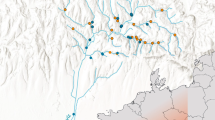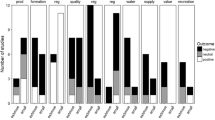Abstract
Recent research has emphasized the importance of riparian ecosystems as centers of biodiversity and links between terrestrial and aquatic systems. Riparian ecosystems also belong among the environments that are most disturbed by humans and are in need of restoration to maintain biodiversity and ecological integrity. To facilitate the completion of this task, researchers have an important function to communicate their knowledge to policy-makers and managers. This article presents some fundamental qualities of riparian systems, articulated as three basic principles. The basic principles proposed are: (1) The flow regime determines the successional evolution of riparian plant communities and ecological processes. (2) The riparian corridor serves as a pathway for redistribution of organic and inorganic material that influences plant communities along rivers. (3) The riparian system is a transition zone between land and water ecosystems and is disproportionately plant species-rich when compared to surrounding ecosystems. Translating these principles into management directives requires more information about how much water a river needs and when and how, i.e., flow variables described by magnitude, frequency, timing, duration, and rate of change. It also requires information about how various groups of organisms are affected by habitat fragmentation, especially in terms of their dispersal. Finally, it requires information about how effects of hydrologic alterations vary between different types of riparian systems and with the location within the watershed.
Similar content being viewed by others
Author information
Authors and Affiliations
Rights and permissions
About this article
Cite this article
NILSSON, C., SVEDMARK, M. Basic Principles and Ecological Consequences of Changing Water Regimes: Riparian Plant Communities. Environmental Management 30, 468–480 (2002). https://doi.org/10.1007/s00267-002-2735-2
Issue Date:
DOI: https://doi.org/10.1007/s00267-002-2735-2




